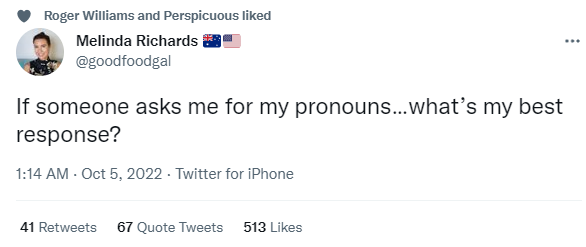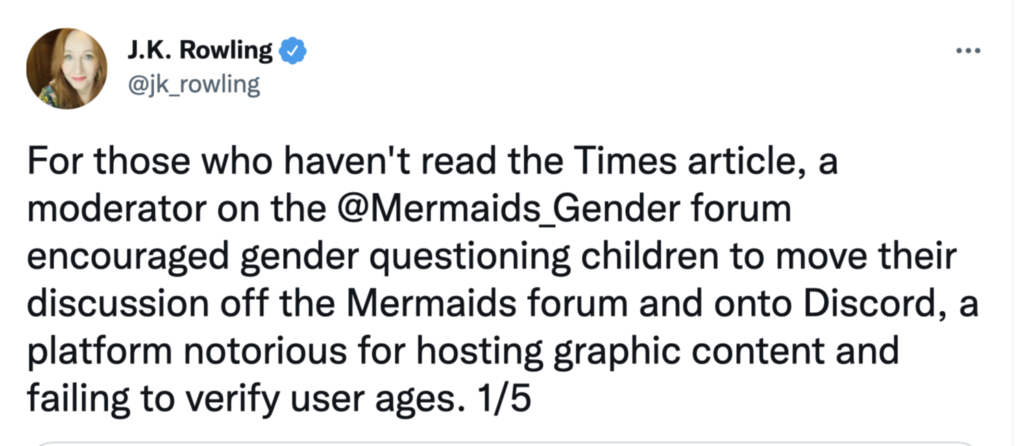PayPal and Etsy Cancel Colin Wright Because He Teaches Basic Biology in his Writings
Biologist Colin Wright explains how PayPal and Etsy banned him for taking the position that there are only two sexes and that they are biologically grounded. He explains the PayPal actions at about the ten-minute mark.
Consider also the context: Colin Wright's background as a Ph.D student studying biology:
Min 8:04:
"I had maybe 100 applications out actually turned my my twitter I locked it down for maybe six months while I was applying for jobs um and when I was writing this one essay the first one I wrote for Quillette called "The New Evolution Deniers." I sent it to my advisor at the time and some of my mentors. They both came back and they said, "This is a fantastic essay. I agree with everything it's completely right, but you cannot publish this. This will ruin your career. If you do publish it don't put your name on it."
To me when the first thing they said was "this is fantastic and it's true." Then, to me, everything after the "but." If I would have not went ahead and published it, that would have just been--every reason that I wanted to get into science in the first place and to be a scientist to pursue truth, to pursue what's real about biology and the natural world--all of a sudden it seemed like academia really wasn't what I wanted it to be like. Do I want to work in an environment that is not going to allow me to say completely obviously true, things is that male and female exist? So really I no longer even wanted to have that job anymore given how much it's changed, since I had gone into it you know 12 years ago now at this point um so yeah so I was actually okay with it destroying my career um because I wanted to to be able to speak the truth."
When Someone Asks for Your Pronouns
On Twitter, Melinda Richards asked: “If someone asks me for my pronouns…what’s my best response?”
Here are some of the suggestions she received:
- "Go with your gut." (Colin Wright)
- “I’m not normalizing this ideology by giving you my pronouns” (Eyes Wide Open)
- 'Why do you want to know?' (Geoffrey Miller)
- “Your Majesty, of course.” (Pierre Chenekoala)
- “The normal ones.” (Gyno Chad)
- “I no speaka de wokie.” (Lou Rider)
- “I identify as a donkey. My pronouns are hee/haw.” (Ryan Rally)
- “Traditional” (MostlyInitTogether)
- “I don’t recognize your religion.” (Lorraine Braddock)
- "You're a bright kid. You work it out." (Dick Nalton)
- “Just say ‘Treat me as a normal person and use the ones you have used 2 years ago.’” (Oliver Reed)
“Point is, 'pronouns' are not used to "address" people - only when talking *about* someone. e.g. "he/she did such&such" When addressing someone, you use their name or title (Doctor, Professor etc), or sir/madam/miss if you don't know their name. So, their 'pronouns' are superfluous.” (Boomerang1)
See also, Colin Wright's article on this topic at the Wall Street Journal.
Reading the Polls Regarding Transgender Ideology
Are you trying to interpret polls regarding transgender ideology? At City Journal, Leor Sapir warns us about the terminology and the numbers:
Last April, a Marist poll commissioned by the organization Do No Harm asked 1,377 Americans about their views on the infiltration of “social justice” ideology into medicine. One question asked whether “minors who identify as transgender and want to undergo hormone treatment or gender transition surgery” should be able to do so “without parental consent,” “only with parental consent,” or not until adulthood (regardless of parental consent). Only 10 percent of all adults surveyed said that minors should be able to access these interventions without parental consent. Twenty-five percent said that parental consent should be required, and 60 percent said minors should never be subject to hormonal or surgical interventions in this context (5 percent were unsure). These findings more or less track with those from a recent New York Times/Siena Poll on (among other things) teaching “sexual orientation and gender identity” content in elementary schools, and it is reasonable to assume that the same people who believe it’s unacceptable for teachers to introduce first-graders to, say, the concept of “non-binary” also think that 12-year-old children should not be given puberty blockers for feeling like they were “born in the wrong body.”It’s useful to compare the Marist poll with yet another recent poll, this one by Pew, which deals with gender-identity issues, as a way to illustrate the importance of how questions are phrased. The Pew poll asked whether it should be “illegal for health care professionals to provide someone younger than 18 with medical care for a gender transition.” Note how this phrasing avoids specifying the procedures (hormones and surgeries), uses terms like “professionals” and “medical care,” and shifts the focus from the procedures themselves to the issue of state involvement in the doctor-patient relationship. Unsurprisingly, public opinion was more evenly divided in the Pew poll, though a plurality still favored restrictions: 46 percent said they support making it illegal for providers to administer medical intervention, 30 percent opposed it, and 22 percent were undecided.
Sapir also warns us about the euphemisms. He lists these in particular:
“Hormone replacement therapy.” A person administered cross-sex hormones (testosterone or estrogen), usually through periodic injections, is not having his or her hormones “replaced;” rather, hormones are introduced to counter the effects of the body’s natural hormone production.“Gender dysphoria.” For those going through or after puberty, the relevant experience here is usually a strong aversion to one’s body parts (such as breasts) or to the body’s natural processes (for example, menstruation).
“Cisgender.” Activists define this as “identifying with the sex one was assigned at birth,” but what this word really means in practice is the lack of debilitating distress associated with one’s sexed body. To be “cisgender” means to feel comfortable, or comfortable enough, with your body and its natural processes such that you don’t seek to make it appear like that of the other sex.
“Children know their gender identity.” This language obscures the key question of whether even sincere and stable cross-gender feelings—or indeed any feelings—in fact amount to “knowledge.”
“LGBTQIA+.” The sole purpose of this acronym is to enable activists making radical claims about human nature and society to piggyback off the far more broadly accepted claims of gay rights.
Mermaid’s Scandal
Apparently, this newly exposed scandal by Mermaids is as big and horrific as the worst excesses of the Catholic Church. J.K. Rowling, who has endured endless threats, including death threats, isn't shying away from these new revelations. I suspect we are now close to hitting peak gender ideology, at least in the U.K.
- Go to the previous page
- 1
- …
- 17
- 18
- 19
- 20
- 21
- 22
- 23
- …
- 31
- Go to the next page



